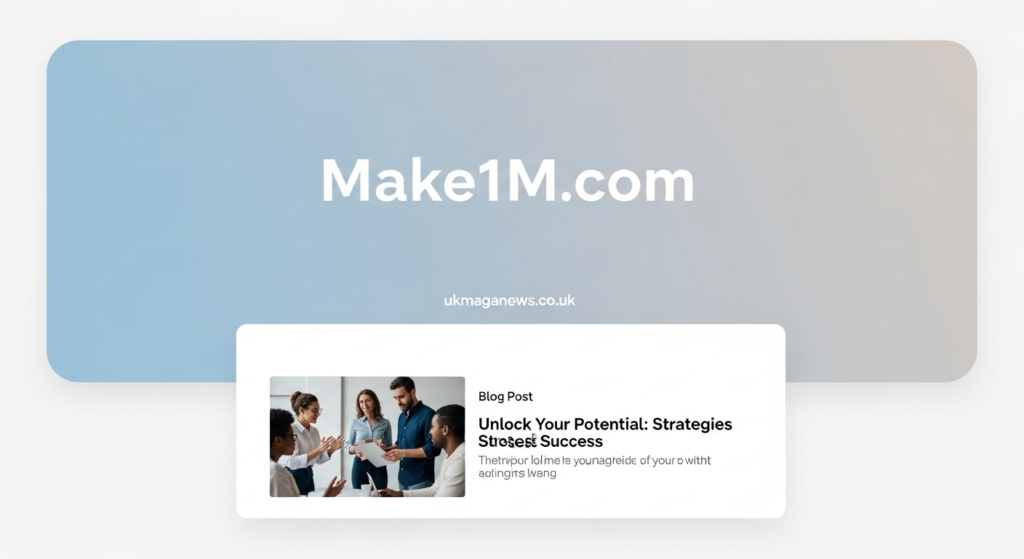Make1M .com: Ultimate Guide to Building Real Wealth

Introduction
Building wealth feels like an impossible dream for most people. You work hard, save what you can, and still wonder if financial freedom will ever become reality. The journey from where you are now to reaching seven figures seems overwhelming and confusing.
That’s where make1m .com comes into the conversation. This platform has gained attention for its approach to wealth building and financial education. Whether you’re just starting your financial journey or looking to accelerate your progress, understanding what resources and strategies work makes all the difference.
In this comprehensive guide, you’ll discover what make1m .com offers, how it approaches wealth creation, and whether its methods align with your financial goals. We’ll explore proven strategies, common pitfalls to avoid, and practical steps you can implement today. By the end, you’ll have a clearer picture of how to move forward on your wealth-building journey.
Understanding the Make1M .com Philosophy
The Foundation of Wealth Creation
The concept behind platforms like make1m .com centers on actionable financial education. Rather than promising overnight riches or get-rich-quick schemes, the focus stays on sustainable wealth building. This approach resonates with people tired of empty promises and looking for genuine guidance.
Building to seven figures requires understanding multiple wealth-building pillars. Income generation forms the base. Smart investing multiplies your money over time. Strategic planning keeps you on track. Risk management protects what you’ve built.
Too many people jump into wealth building without a clear framework. They chase trends, follow hot tips, and wonder why results never materialize. A structured approach based on proven principles delivers far better outcomes than random financial decisions.
Why Traditional Advice Often Fails
Traditional financial advice often comes from people disconnected from everyday struggles. They tell you to save more without acknowledging that many people already stretch every dollar. They recommend complex investment strategies that require significant starting capital.
The reality is that most people need practical guidance that meets them where they are. You can’t implement strategies designed for millionaires when you’re living paycheck to paycheck. The disconnect between advice and reality creates frustration and inaction.
Modern wealth building requires updated strategies for today’s economic landscape. The rules that worked for previous generations don’t always apply now. Housing costs have skyrocketed. Student debt burdens millions. Healthcare expenses drain savings. Any platform addressing wealth must acknowledge these realities.
Core Wealth Building Strategies
Maximizing Your Income Potential
Your income represents the fuel for your wealth-building engine. Without sufficient income, saving and investing become exponentially harder. That’s why increasing your earning power should be a top priority in your financial journey.
Career advancement offers one path to higher income. Developing valuable skills makes you more marketable. Seeking promotions or switching companies can boost your salary significantly. Don’t stay in positions where your compensation stagnates for years.
Side hustles and additional income streams create financial flexibility. The internet has opened countless opportunities for earning extra money. Freelancing, consulting, creating digital products, or building online businesses all offer potential paths. Even an extra few hundred dollars monthly compounds dramatically over time.
Negotiation skills directly impact your lifetime earnings. Many people accept initial offers without negotiating. This single mistake can cost hundreds of thousands over a career. Learning to confidently discuss compensation pays immediate dividends.
Smart Investing for Long Term Growth
Investing transforms saved money into growing wealth. Your money needs to work as hard as you do. Leaving large amounts in low-interest savings accounts means losing purchasing power to inflation over time.
Stock market investing through index funds provides accessible entry points for most people. You don’t need to pick individual stocks or time the market. Consistent contributions to diversified funds have historically generated solid returns over long periods.
Real estate offers another wealth-building vehicle that many successful people utilize. Whether through rental properties, house flipping, or real estate investment trusts, property investments can generate passive income and appreciation. The key is understanding your local market and making informed decisions.
Alternative investments like businesses, intellectual property, or peer-to-peer lending deserve consideration as your wealth grows. Diversification across asset classes reduces risk and creates multiple income streams. Don’t put all your eggs in one basket regardless of how confident you feel.
The Power of Compound Growth
Compound growth represents the most powerful force in wealth building. When your returns generate additional returns, growth accelerates exponentially. Starting early gives you the massive advantage of time on your side.
A simple example illustrates this power. Investing $500 monthly starting at age 25 with 8% annual returns grows to over $1.7 million by age 65. Wait until 35 to start, and that same monthly investment yields about $745,000. Those ten years cost you nearly a million dollars.
This math explains why make1m .com and similar platforms emphasize starting immediately. Even small amounts invested consistently outperform large amounts invested sporadically. The discipline of regular investing matters more than trying to time perfect entry points.
Tax-advantaged accounts supercharge compound growth by protecting returns from annual taxation. Maximizing contributions to retirement accounts should be non-negotiable for serious wealth builders. The tax savings alone can add hundreds of thousands to your final balance.
Avoiding Common Wealth Building Mistakes
The Lifestyle Inflation Trap
One of the biggest obstacles to wealth building is lifestyle inflation. As income rises, spending rises to match or exceed it. This pattern keeps people trapped regardless of how much they earn.
You’ve probably seen this scenario play out. Someone gets a raise and immediately upgrades their car, apartment, or lifestyle. Within months, they feel just as financially stressed as before despite earning more. The hedonic treadmill keeps spinning without building actual wealth.
Breaking this cycle requires conscious decision making. When your income increases, direct a significant portion toward savings and investments before adjusting your lifestyle. Allow yourself some rewards for hard work, but don’t let spending consume every extra dollar.
Living below your means creates the gap between income and expenses where wealth accumulates. This doesn’t mean living miserably or denying yourself everything enjoyable. It means making intentional choices about where money provides genuine value versus temporary satisfaction.

Emotional Investing Decisions
Emotions destroy more wealth than bad market conditions. Fear causes people to sell at the bottom. Greed drives them to buy at peaks. Following these impulses guarantees poor results regardless of your strategy.
The 2020 market crash tested many investors. Those who panicked and sold locked in massive losses. Those who stayed invested or bought during the decline benefited enormously from the recovery. The difference came down to emotional discipline.
Creating rules-based systems removes emotion from investing decisions. Decide your asset allocation in advance. Commit to regular contributions regardless of market conditions. Rebalance periodically according to a schedule rather than feelings. These systems protect you from your worst impulses.
Education reduces emotional reactions by building confidence in your strategy. Understanding market history shows that volatility is normal and temporary declines are inevitable. This perspective helps you stay calm when others panic.
Ignoring Risk Management
Pursuing wealth aggressively without protecting what you build creates unnecessary vulnerability. Insurance, emergency funds, and proper estate planning seem boring compared to investment returns, but they’re essential foundations.
An adequate emergency fund prevents you from derailing long-term plans during temporary setbacks. Aim for three to six months of expenses in accessible savings. This buffer keeps you from selling investments at bad times or going into debt for unexpected costs.
Proper insurance protects against catastrophic losses that could wipe out years of progress. Health insurance, disability insurance, life insurance if others depend on you, and adequate property coverage all deserve attention. One uninsured disaster can destroy a lifetime of wealth building.
Estate planning ensures your wealth transfers according to your wishes and minimizes tax burdens on heirs. Wills, trusts, and beneficiary designations require periodic review and updates. Don’t assume everything will work out without proper documentation.
Building Multiple Income Streams
The Security of Diversified Income
Relying entirely on a single job for income creates vulnerability. Company restructuring, economic downturns, or industry disruption can eliminate that income overnight. Diversifying income sources builds resilience against these risks.
Multiple income streams don’t mean working 80-hour weeks forever. Strategic diversification focuses on creating semi-passive or passive income over time. The initial effort investment pays ongoing returns without constant active involvement.
Rental income from real estate provides one example. After acquiring and setting up properties, professional management can handle day-to-day operations. You receive monthly income with minimal time investment after the initial work.
Dividend-paying stocks create another passive income stream. These investments send regular cash payments regardless of market fluctuations. Reinvesting dividends during accumulation phases accelerates growth. Taking them as income in later phases provides cash flow.
Digital Income Opportunities
The internet has democratized wealth building in unprecedented ways. You can now reach global audiences and create scalable income sources from your home. These opportunities weren’t available to previous generations.
Content creation through blogs, YouTube channels, or podcasts can generate advertising revenue, sponsorships, and affiliate income. Building an audience takes time and consistency, but the potential payoff justifies the effort. Your content works for you 24/7 once created.
Digital products like courses, ebooks, templates, or software offer high-margin income opportunities. Create once, sell infinitely with minimal marginal costs. This model allows individual creators to build substantial businesses without traditional overhead.
Freelancing and consulting let you monetize existing skills immediately. Platforms connect service providers with clients worldwide. Whether you offer writing, design, programming, marketing, or coaching, opportunities exist to earn additional income on your schedule.
Building Business Equity
Starting or buying businesses creates wealth through equity appreciation beyond just income. Successful businesses become valuable assets you can eventually sell or pass down. This path requires more risk and effort but offers unlimited upside potential.
Many millionaires built wealth primarily through business ownership rather than saving and investing alone. Businesses scale in ways that jobs cannot. Your income isn’t capped by salary structures or hourly rates.
You don’t need revolutionary ideas to build successful businesses. Solving common problems better than existing solutions, serving underserved markets, or improving on existing business models all create opportunities. Execution matters more than novelty.
Starting small and scaling gradually reduces risk while you learn. Many successful businesses began as side projects that eventually replaced day jobs. This approach lets you test concepts without betting everything upfront.
The Psychology of Wealth Building
Developing a Wealth Mindset
Your relationship with money significantly impacts your ability to build wealth. Limiting beliefs about money, success, or your worthiness create invisible barriers. Addressing these psychological factors is just as important as understanding financial strategies.
Many people carry money scripts from childhood that sabotage adult financial success. “Money doesn’t grow on trees,” “rich people are greedy,” or “I’m just not good with money” become self-fulfilling prophecies. Identifying and challenging these beliefs opens new possibilities.
Adopting an abundance mindset versus scarcity thinking changes how you approach opportunities. Scarcity thinking sees wealth as a zero-sum game where someone else’s success diminishes your chances. Abundance thinking recognizes unlimited opportunities to create value and wealth.
Successful wealth builders view money as a tool rather than an end goal. Money provides freedom, security, and the ability to help others. This perspective maintains motivation without creating unhealthy obsession or greed.
Patience and Delayed Gratification
Building substantial wealth requires patience that modern culture actively works against. We’re conditioned for instant gratification through social media, on-demand entertainment, and one-click shopping. Wealth building operates on completely different timelines.
The ability to delay gratification predicts financial success more reliably than intelligence or education. Choosing long-term rewards over immediate pleasure separates those who build wealth from those who struggle financially. This skill can be developed through practice.
Understanding that wealth compounds exponentially helps maintain patience during slow early years. The first $100,000 feels impossibly slow to accumulate. The journey from $100,000 to $500,000 happens faster. Reaching seven figures accelerates further as compound growth kicks in.
Celebrating milestones along the journey maintains motivation during the marathon. Don’t wait until reaching your final goal to acknowledge progress. Hitting your first $10,000, $50,000, or $100,000 saved deserves recognition even though the ultimate target is higher.
Learning from Failure and Setbacks
No wealth-building journey proceeds in a straight line without obstacles. Investments underperform. Businesses fail. Unexpected expenses derail plans. How you respond to these setbacks determines ultimate success.
Viewing failures as learning opportunities rather than permanent defeats builds resilience. Every successful entrepreneur has failure stories. The difference is they extracted lessons and adjusted rather than quitting. Your worst investments often teach the most valuable lessons.
Building wealth requires taking calculated risks, and not all risks pay off. Accepting this reality upfront prevents devastation when specific bets don’t work. Proper risk management ensures that no single failure derails your entire journey.
Maintaining perspective during difficult periods prevents emotional decisions that compound problems. Market downturns feel permanent while experiencing them but are temporary blips in long-term charts. Temporary setbacks don’t erase consistent progress over time.
Practical Steps to Start Today
Assessing Your Current Financial Position
You can’t plan a route without knowing your starting point. Begin by honestly assessing your complete financial picture. This baseline shows exactly where you stand and what needs addressing first.
Calculate your net worth by subtracting all debts from all assets. This number might be negative if you’re early in your journey, and that’s okay. Tracking this figure quarterly shows progress that keeps you motivated.
Review your monthly cash flow in detail. Track every dollar coming in and going out for at least a month. Most people dramatically underestimate their spending until they see actual numbers. This awareness enables intelligent adjustments.
List all debts with balances, interest rates, and minimum payments. High-interest debt actively works against wealth building. Creating a payoff strategy should be an immediate priority if you carry expensive debt.
Creating Your Wealth Building Plan
A written plan transforms vague desires into actionable roadmaps. Define specific, measurable goals with realistic timelines. “Build wealth” is too vague. “Accumulate $250,000 in invested assets within seven years” provides clarity and motivation.
Break big goals into smaller milestones that feel achievable. The journey to seven figures starts with reaching $10,000, then $25,000, then $50,000. Each milestone proves the goal is realistic and builds confidence.
Determine how much you need to save and invest monthly to reach your goals. Online calculators help project growth based on different contribution amounts and return assumptions. Adjust variables until you find a realistic yet ambitious target.
Identify specific actions you’ll take this month, this quarter, and this year. Vague plans produce vague results. Commit to concrete steps like increasing 401k contributions by 2%, starting a side hustle, or reading two investing books monthly.
Implementing and Adjusting Your Strategy
Taking action separates dreamers from wealth builders. Perfect plans executed imperfectly beat perfect plans never implemented. Start with what you can do today rather than waiting for ideal conditions.
Automate as much as possible to remove willpower from the equation. Automatic transfers to investment accounts happen whether you feel motivated or not. Automation ensures consistency that manual approaches often lack.
Review progress quarterly and adjust as needed. Your plan should be flexible enough to adapt to changing circumstances while maintaining core principles. Life changes, opportunities emerge, and strategies need updating.
Find accountability through communities, partners, or coaches who support your goals. Sharing your journey with others who understand wealth building provides motivation and valuable perspectives. You don’t have to do this alone.

The Role of Financial Education
Continuous Learning as a Wealth Builder
The financial landscape constantly evolves with new investment vehicles, tax laws, and economic conditions. Committing to ongoing education keeps you informed and able to capitalize on opportunities others miss.
Reading books by proven wealth builders provides concentrated wisdom. Countless millionaires share their journeys and lessons in detail. Learning from others’ successes and mistakes accelerates your progress dramatically.
Podcasts and YouTube channels offer free access to expertise that once cost thousands in consulting fees. Choose sources carefully, prioritizing educators with proven track records over entertainers promising easy riches.
Formal courses in investing, business, or financial planning fill knowledge gaps systematically. The investment in education pays enormous returns through better decision making over decades.
Understanding Tax Optimization
Taxes represent one of your largest lifetime expenses. Understanding legal tax optimization strategies keeps more money working for you. This area offers significant wealth-building leverage that many people ignore.
Maximizing tax-advantaged account contributions provides immediate returns through deductions and tax-free growth. Traditional and Roth IRAs, 401ks, and HSAs all offer valuable tax benefits when used strategically.
Understanding capital gains taxation influences when and how you sell investments. Long-term gains receive preferential treatment compared to short-term gains. This knowledge affects holding periods and realization strategies.
Working with qualified tax professionals becomes worthwhile as your wealth grows. The fees pay for themselves through optimizations you’d likely miss. Don’t try to save a few hundred dollars on professional advice while losing thousands in unnecessary taxes.
Avoiding Scams and Bad Advice
The wealth-building space attracts both genuine educators and predatory scammers. Developing discernment protects you from schemes that set you back rather than moving you forward.
Be extremely skeptical of anyone promising guaranteed returns, especially if they’re significantly above market averages. “Too good to be true” remains reliable guidance. Legitimate investments carry risk, and honest advisors acknowledge this.
Research credentials and track records before following financial advice. Many self-proclaimed experts have no verifiable success. Look for transparent backgrounds, proper licensing, and demonstrated results over time.
Trust your instincts when something feels off. High-pressure sales tactics, complex explanations, or reluctance to provide documentation all signal potential problems. Legitimate opportunities don’t disappear if you take time for due diligence.
Long Term Wealth Maintenance
Protecting Your Assets
Building wealth is only half the equation. Protecting what you’ve accumulated ensures it serves you long term and transfers according to your wishes. This aspect receives less attention but proves equally important.
Asset protection strategies vary based on your wealth level and specific risks. Proper business structuring, insurance coverage, and legal entities all play roles. Consulting specialists becomes important as your net worth grows.
Cybersecurity protects your financial accounts and identity from digital threats. Use strong passwords, enable two-factor authentication, and monitor accounts regularly. Identity theft can create years of headaches and financial damage.
Relationship considerations affect wealth protection, particularly around marriage and divorce. Prenuptial agreements, proper beneficiary designations, and joint account structures all deserve thoughtful consideration.
Estate Planning Essentials
Estate planning ensures your wealth transfers efficiently to heirs and causes you care about. Without proper planning, significant portions might go to taxes or unintended recipients through default state laws.
A will forms the foundation but isn’t sufficient for larger estates. Trusts offer greater control, privacy, and potential tax advantages. The specific structures depend on your situation, family dynamics, and goals.
Beneficiary designations on retirement accounts and life insurance supersede wills. Review these regularly, especially after major life changes like marriages, divorces, or births. Outdated beneficiaries create unintended outcomes.
Having difficult conversations with heirs about inheritance plans prevents surprises and conflicts later. Transparent communication about your wishes and reasoning helps families navigate transitions smoothly.
Giving Back and Creating Legacy
Many people find that true wealth satisfaction comes from positive impact beyond personal consumption. Charitable giving, supporting causes, and helping others provides meaning that accumulation alone doesn’t deliver.
Strategic philanthropy maximizes impact while providing tax benefits. Donor-advised funds, charitable trusts, and direct giving each offer different advantages. Aligning your giving with values creates fulfillment beyond financial returns.
Building wealth allows you to help family members in meaningful ways. Funding education, helping with home purchases, or supporting family businesses can transform multiple lives. Balance generosity with maintaining your own financial security.
Your legacy extends beyond money to include values, lessons, and examples you provide. How you build, manage, and use wealth teaches others through actions. This intangible inheritance often matters more than dollar amounts.
Conclusion
The journey to building substantial wealth through platforms and strategies like those discussed around make1m .com requires commitment, education, and consistent action. There’s no magic formula, but proven principles applied diligently over time produce remarkable results.
Start where you are with what you have. Increase income, reduce unnecessary expenses, invest consistently, and protect your assets. Learn continuously, adjust strategies based on results, and maintain patience through inevitable challenges.
The path to seven figures is absolutely achievable for ordinary people willing to prioritize financial goals and execute smart strategies. Your background, current situation, or past mistakes don’t determine your financial future. Your decisions and actions from this point forward make all the difference.
What’s the first step you’ll take today toward building real wealth? Will you assess your current position, increase your savings rate, or start that side business you’ve been considering? The best time to start was yesterday. The second best time is right now.
FAQs
What is make1m .com about?
Make1m .com focuses on wealth building strategies and financial education aimed at helping people reach seven-figure net worth. The platform provides resources, guidance, and actionable advice for various income levels and financial situations. It emphasizes sustainable approaches over get-rich-quick schemes.
How long does it take to build a million dollars?
The timeline varies dramatically based on income, savings rate, investment returns, and starting point. Someone saving $1,000 monthly with 8% annual returns reaches $1 million in approximately 30 years. Higher contributions or returns shorten this timeline significantly. Starting earlier provides the biggest advantage.
Do I need a high income to build significant wealth?
While higher income helps, it’s not absolutely necessary. Many millionaires built wealth on middle-class incomes through consistent saving, smart investing, and living below their means. Your savings rate and investment strategy matter more than raw income. Lifestyle choices determine how much income actually builds wealth.
What are the safest wealth building strategies?
Diversified index fund investing, contributing to tax-advantaged retirement accounts, and maintaining emergency funds provide safe foundations. Real estate in stable markets offers another relatively safe option. Avoiding high-risk speculation, excessive debt, and emotional decisions protects wealth while allowing growth.
Should I pay off debt or invest first?
Generally, eliminate high-interest debt above 7-8% before aggressive investing since you’re guaranteed that return through debt payoff. Make minimum payments on low-interest debt while investing simultaneously. Always build a small emergency fund first to avoid creating new debt during unexpected expenses.
What’s the biggest mistake new wealth builders make?
Lifestyle inflation as income rises prevents most people from building wealth despite earning good money. Spending increases to match or exceed income gains, keeping them perpetually stuck. Failing to start investing early due to perceived insufficient amounts also costs enormously through lost compound growth.
How much should I save and invest monthly?
Aim for saving and investing at least 20% of gross income, though higher percentages accelerate wealth building. Start with whatever you can manage and increase gradually. Many successful wealth builders eventually save 40-50% or more by keeping lifestyle costs stable while income grows.
Are side hustles really worth the effort?
Side hustles providing an extra $500 to $2,000 monthly can dramatically accelerate wealth building. That additional income invested consistently compounds to substantial amounts over time. Beyond money, side hustles develop skills, create opportunities, and potentially grow into full-time businesses.
How do I know if financial advice is trustworthy?
Look for transparent credentials, verifiable track records, and alignment with established financial principles. Be wary of guaranteed returns, high-pressure tactics, or extremely complex strategies. Research advisors through regulatory databases and seek referrals from trusted sources before committing.
What role does luck play in wealth building?
Some luck certainly factors in through timing, opportunities, and circumstances. However, consistent execution of sound principles produces wealth regardless of luck. You create your own luck by preparing to recognize opportunities, taking calculated risks, and persisting through setbacks.
Also Read ukmaganews.co.uk



